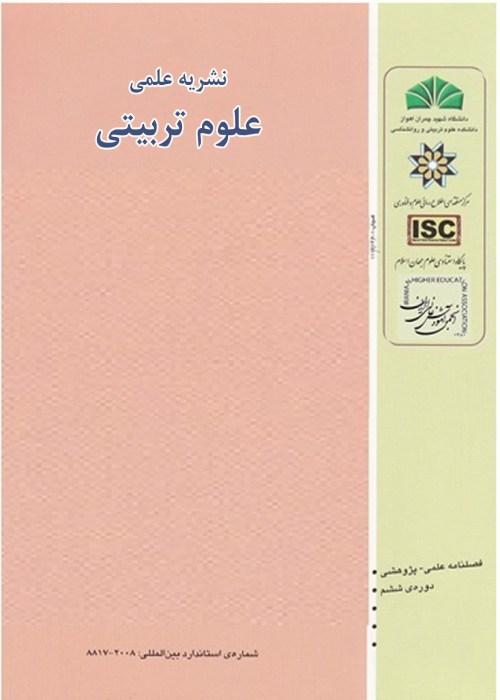Examining the Concept of Participation and Involvement in Children's Education: A Reflection on Parents and Teacher's Perception
Author(s):
Abstract:
This paper aims to study parents and teachers perception of the parent participation phenomenon in education. A mixed-methods sequential explanatory design was applied. Participants included 200 teachers and 210 parents who were selected viamulti-stage cluster sampling from different socio-economic regions of Kermanshah City. In order to collect data, initially some semi-structured interviews were held. Subsequently, based on highlighted components from interviews, a questionnaire was designed for gathering quantitative data. The validity and reliability measures of the questionnaire were confirmed via exploratory factor analysis and Cronbachs Alpha. Factors representing quality and mechanisms of participation, types of interaction and psychological and social impacts of participation were derived from the interviews. The findings revealed that almost all of the parents had not been purposefully involved in the educational performance of their children and there was no evidence of parental cooperation as a group was surfaced. The findings indicated that although the parents to a large extent were aware of the importance of their involvement in their childrens education in practice they failed to engage in this activity for several reasons. The parents stated that they were rarely in touch with teachers and were not fully aware of their childrens learning difficulties. In addition the extent of parents voluntary participation in the education process of their children was not satisfactory and they rarely helped and guided their children with their homework. Furthermore, despite teachers, parents want that their children to be encouraged to do their school work. Also, unlike the children's fathers, their mothers were more interested in accepting responsibility for the education of their children. However, there is some kind of disagreement between teachers and parents on how to participate in educational affairs. Thus, teachers were unwilling to allow parents to be involved in the educational process. Finally, the findings revealed that in addition to the teachers and parents support as effective factors regarding the students habits of study and effort, the student's opinions should be taken into account and considered seriously.
Keywords:
Language:
Persian
Published:
Education Journal, Volume:22 Issue: 2, 2016
Pages:
21 to 54
magiran.com/p1706607
دانلود و مطالعه متن این مقاله با یکی از روشهای زیر امکان پذیر است:
اشتراک شخصی
با عضویت و پرداخت آنلاین حق اشتراک یکساله به مبلغ 1,390,000ريال میتوانید 70 عنوان مطلب دانلود کنید!
اشتراک سازمانی
به کتابخانه دانشگاه یا محل کار خود پیشنهاد کنید تا اشتراک سازمانی این پایگاه را برای دسترسی نامحدود همه کاربران به متن مطالب تهیه نمایند!
توجه!
- حق عضویت دریافتی صرف حمایت از نشریات عضو و نگهداری، تکمیل و توسعه مگیران میشود.
- پرداخت حق اشتراک و دانلود مقالات اجازه بازنشر آن در سایر رسانههای چاپی و دیجیتال را به کاربر نمیدهد.
In order to view content subscription is required
Personal subscription
Subscribe magiran.com for 70 € euros via PayPal and download 70 articles during a year.
Organization subscription
Please contact us to subscribe your university or library for unlimited access!



